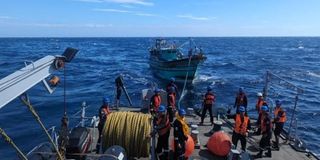Wanted: Regional collaboration to defeat maritime threats

What you need to know:
- The Houthis have been targeting Israeli-linked cargo ships in the Red Sea and Gulf of Aden in solidarity with the Gaza Strip, which has been under an Israeli onslaught since October 7 last year.
Dar es Salaam. Alarmed by recurrent attacks on ships in the Red Sea and the Indian Ocean and the impact on global fuel prices, International Maritime Organization (IMO) is advocating a regional collaboration to address maritime security threats effectively.
The Houthis have been targeting Israeli-linked cargo ships in the Red Sea and Gulf of Aden in solidarity with the Gaza Strip, which has been under an Israeli onslaught since October 7 last year.
The attacks have seen some fuel vessels diverting the Red Sea and some parts of the Indian Ocean and instead prefer longer routes that send prices of fuel and other vital commodities up.
Speaking in Dar es Salaam yesterday, IMO Secretary-General Arsenio Dominguez called upon a regional collaboration to address vice and reiterated IMO’s commitment to providing technical support.
He said that initiatives such as the European Union-supported Port Security and Safety of Navigation project in Eastern and Southern Africa, alongside the Indian Ocean and Red Sea projects, have strengthened a coordinated, whole-of-government approach.
Speaking at the 7th High-Level Meeting on the implementation of the Djibouti Code of Conduct (DCoC) and the Jeddah Amendment, Mr Dominguez emphasized the need for practical and sustainable solutions to global maritime security challenges.
“We are particularly grateful for EU-funded initiatives like the Port Security and Safety of Navigation project and the Red Sea projects. These efforts foster a cohesive, secure, and pollution-free maritime environment by helping establish National Maritime Security Committees,” he said.
Mr Dominguez highlighted the critical role of maritime safety and security in the Western Indian Ocean and Gulf of Aden regions, particularly in supporting global trade. He cautioned that gaps in these areas could negatively impact lives, economies, and livelihoods.
“We recognise the progress you have collectively made, including training over 1,800 beneficiaries under the Djibouti Code of Conduct. This initiative has been pivotal in establishing regional maritime information-sharing centers in Dar es Salaam, Mombasa, and Sana’a, significantly reducing piracy since 2009,” he said.
Tanzania’s Transport minister, Prof Makame Mbarawa, highlighted the significance of hosting the meeting in Dar es Salaam, the birthplace of the Djibouti Code of Conduct.
“In 2008, we convened here to address piracy in our region. The resulting Djibouti Code of Conduct, established in 2009 and amended in 2017, expanded its scope to include transnational maritime threats beyond piracy,” he said.
Prof Mbarawa emphasised the Jeddah Amendment’s recognition of the blue economy’s vital role in fostering sustainable economic growth, food security, and stability. However, he expressed concern about persistent crimes such as piracy, armed robbery, and fisheries crimes, which pose significant risks to maritime safety and the environment.





